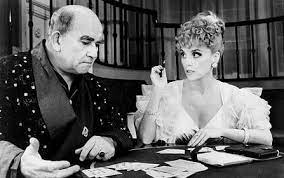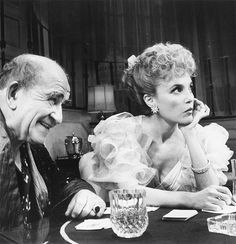

I was not born yesterday. I’ve lived a reasonably interesting life up to this point, having read hundreds of books, seen dozens of plays, and watched innumerable movies, among them George Cukor’s "Born Yesterday" starring Judy Holliday and Broderick Crawford. It’s been many years since I last viewed that acknowledged classic, and I remember enjoying the film and agreeing that the leads were perfectly cast, but since I was not born yesteryear, the flick didn’t seep into my consciousness and become one of my all-time favorites, either. I mention this to explain why I don’t consider myself unfairly biased in favor of the 1950 movie when I criticize the failure of this new production.
What went wrong? The actors are not miscast. David Potts’s set is bright and functional. The play is still clever enough to hold an audience, and certainly the time is right for a sly comedy poking fun at rich philistines who own politicians. Perhaps the mistake was throwing well-known stars into famous roles and expecting instant chemistry. As last year’s tepid production of Arsenic and Old Lace proved, sitcom stars don’t necessarily bring their ensemble skills to the stage.
For those who’ve missed it on the late shows, Born Yesterday presents Harry Brock, a crude junkman-cum-bigwig planning to take Washington DC by storm. Afraid of suffering social embarrassment at the hands of Billie Dawn, his empty-headed paramour, Brock hires a local reporter to tutor his tart and make her smart. The teacher succeeds all too well, and the student soon comes to realize the way Harry has been manipulating her, not to mention senators and congressmen. Billie finally has the chance to discover her real self, but not before Mr. Brock gets his comeuppance.
Garson Kanin’s play gives us an overtly sexual bimbo, a boorish male lead, a few stabs at rich politicians and greedy capitalists — all bracingly sharp in 1946 but quite tame now. One sympathizes with the playwright for saving his secret weapon (Judy Holliday) until as late in the play as possible, but after Billie Dawn’s brief early entrance, there’s an agonizing stretch of exposition bogging down most of act one. Kanin’s giddy Galatea enlivens the second half, but there’s still a sense of contrivance — right down to Harry’s sexist grunts and Billie’s bon mots.
Still, better direction and a cheerier cast would help a great deal. In what one assumes is an effort to modernize the style of the action, Josephine R. Abady has directed the farce as if it were Ibsen. Even when the junkman bellows, the play remains eerily quiet. Characters enter and exit with a somber sense of purpose expecting Mr. Kanin’s moderate wit to levitate them. Ms. Abady, who brought out the best in last season’s The Boys Next Door, seems to be dragging this one through its uninspired paces.
As trasheau-riche Harry Brock, Edward Asner gives a competent performance that lacks charm and basic underlying empathy. Granted, it would take a hell of an actor to squeeze sympathy out of a role in which he slaps the girl and, two minutes later, begs for sympathy from the audience by dolefully admitting, “I’m in love with her!” Mr. Asner has transformed his Lou Grant bark into an ugly snarl that is intelligible but hinders comic delivery. It’s understandable that once Billie wises up, she yearns for a beyond Harry, but we don’t even sense a compatibility in the entire history of their relationship.
Madeline Kahn’s performance is more difficult to dissect. She appears to mimic Judy Holliday but without the springy life force that turned an actress into an icon. Ms. Kahn has all the moves down, and she looks terrific in Ann Roth’s stylish dresses, but at times she’s nearly inaudible, and when we do hear her, her delivery lacks punch. Thus, in the famous gin-rummy scene, we are impressed by Ms. Kahn’s manual dexterity, but what should be riotous is merely amusing. By the time Kahn’s Billie manages a few savory parting shots at her keeper, we’ve become passive observers waiting for the machinations to play themselves out.
Daniel Hugh Kelly is appealing in the role of Billie’s tutor in love, and Franklin Cover (the snotty elevator operator in TV’s "Jeffersons") does good work as Harry’s alcoholic henchman, living a life of quiet desperation.
Despite some enjoyable passages toward evening’s end, the production often falls as flat as old seltzer. The show may be born yesterday, but if this staging is any indication, it’s gotten old real fast.
